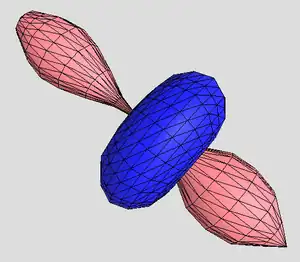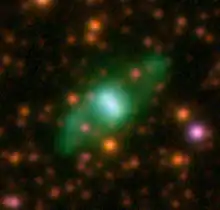| Emission nebula | |
|---|---|
| Planetary nebula | |
 | |
| Observation data: J2000 epoch | |
| Right ascension | 18h 22m 32.08s[1] |
| Declination | −24° 09′ 27.7″[1] |
| Distance | 30,800 (9444 pc)[1] ly |
| Apparent magnitude (V) | 13.9[1] |
| Apparent dimensions (V) | 4″[1] |
| Notable features | Bipolar outflow, Bipolar nebula |
| Designations | PN M 2-42 PNG 008.2-04.8 |
Minkowski 2-42, abbreviated M2-42, is a planetary nebula that was discovered by Rudolph Minkowski in 1947.[2] It is located about 30,800 light-years away from Earth in the Galactic bulge.[1] It is known to be a bipolar planetary nebula containing two jets of material emerging from both sides of its central star.[3] It has been found that its bipolar outflows have the typical features of Fast Low-Ionization Emission Region (FLIER). [3]
The central star of M2-42 is classified as weak emission-line star,[4] but its nitrogen and helium features[5] may be linked to nitrogen sequences of Wolf-Rayet central stars of planetary nebula ([WN]).[3] The chemical composition of this planetary nebula was found to be around the solar metallicity.[6]

See also
References
- 1 2 3 4 5 6 "PN M2-42". SIMBAD. Centre de données astronomiques de Strasbourg. Retrieved September 4, 2021.
- ↑ Minkowski, R. (1947). "New Emission Nebulae (II)". Publications of the Astronomical Society of the Pacific. 59 (350): 257. Bibcode:1947PASP...59..257M. doi:10.1086/125962. S2CID 250797181.
- 1 2 3 Danehkar, A.; Parker, Q. A.; Steffen, W. (2016). "Fast, low-ionization emission regions of the planetary nebula M2-42". The Astrophysical Journal. 151 (2): 38. arXiv:1601.01702. Bibcode:2016AJ....151...38D. doi:10.3847/0004-6256/151/2/38. S2CID 53006455.
- ↑ Tylenda, R.; Acker, A.; Stenholm, B. (1993). "Wolf-Rayet nuclei of planetary nebulae. Observations and classification". Astronomy and Astrophysics Supplement Series. 102: 595–602. Bibcode:1993A&AS..102..595T.
- ↑ DePew, K.; Parker, Q. A.; Miszalski, B.; De Marco, O.; Frew, D. J.; Acker, A.; Kovacevic, A. V.; Sharp, R. G. (2011). "Newly discovered Wolf-Rayet and weak emission-line central stars of planetary nebulae". Monthly Notices of the Royal Astronomical Society. 414 (4): 2812–2827. arXiv:1101.2468. Bibcode:2011MNRAS.414.2812D. doi:10.1111/j.1365-2966.2011.18337.x. S2CID 11319403.
- ↑ Wang, W.; Liu, X. -W. (2007). "Elemental abundances of Galactic bulge planetary nebulae from optical recombination lines". Monthly Notices of the Royal Astronomical Society. 381 (4): 669–701. arXiv:0707.0542. Bibcode:2007MNRAS.381..669W. doi:10.1111/j.1365-2966.2007.12198.x. S2CID 14459450.